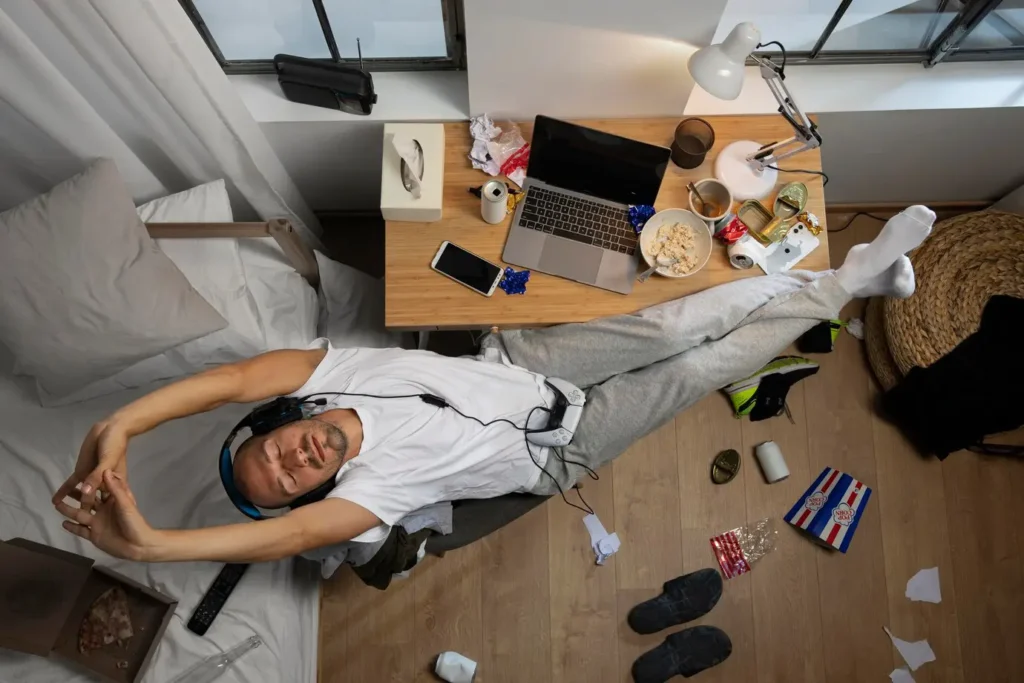Benefits of Laziness: Why Doing Nothing Can Be Good!
As long as the going gets in the way of our productivity, we elevate productivity to the highest standard of success. Whether it is about work-related activities or personal responsibilities, people have to be on the go and constantly work towards achieving their goals. Thus, the lazy label has developed into one of our greatest insults. Why doing nothing can be good ? But what does it mean to be lazy?
This expression often refers to lacking ambition or not being excited to tackle work. It is usually associated with procrastination, avoidance of responsibilities, or a general unwillingness to do any job . The stereotype of being lazy could harm a person’s self-esteem and happiness. As a result, you may feel guilty and not good enough for not reaching the productivity and busyness standards set by everyone else around you.

The Benefits of Embracing Inactivity
This dislike of laziness has created the perspective that laziness is a personal defect needing fixing. But what if we flip this idea to consider laziness through another lens? Are there perhaps benefits to leaning into moments of idleness?
First, we must recognize that we function better when we take breaks and have downtime. Like our bodies needing downtime after psycho-physical exercise, our brains need time to rest and refresh. Constantly forcing ourselves to do more than we can handle leads to burnout and fatigue, which is detrimental to productivity. Also, it can help you be more creative when getting away from the job. Daydreaming opens us up to new and different ideas whose inspiration doesn’t come to us while we’re working hard.
Another argument for lying idle is that it can help us prioritize our tasks and determine what matters most to us in a world overflowing with things to do. Though laziness is frowned upon in society, knowing how much breaks and relaxation can contribute to your wellness is essential. Finding a balance between work and rest is hard, and as it turns out, sometimes having a lazy day can give you back your will to work, making you more productive in the long run. I maintain that inactivity is vital in our lives and has positive implications for our bodies and minds.
Rest can feel like a luxury or a weakness in a bustling world. But you do that often- breaks and just doing nothing have many benefits for the mind and the body. Taking time to rest and relax is a requirement for our overall well-being.
Physically, we must allow the body to rest and re-energize to be healthy. We take breaks from work or activities so our muscles can relax and heal from the heavy work they have to do; this reduces the likelihood of tension or pain developing, which can progress to chronic conditions like back pain. In addition, resting allows our immune system to solidify, allowing us to fight diseases better.
Resting and relaxing can rejuvenate our brains mentally. They provide us with a reprieve from chronic stimulation, which leads to burnout. Taking time away from work or other responsibilities gives us space to unwind and release ourselves from the mental burdens of whatever has been occupying our minds. This can help boost our mood and lower anxiety levels, as well as increase overall mental clarity.
Even more, doing nothing can enhance creativity. Ideas that come to those of us who are not actively working on them — but remain with them when we say that you take your time- will be when your brain is relaxed and not under pressure. Breaks offer our brains the freedom to roam with no expectations or deadlines hanging over us.
Aside from the physical and mental benefits, rest itself helps with productivity in the long term. It sounds counterintuitive at first — how can giving yourself a break help you get things done? – studies indicate that taking breaks during the day enhances concentration and helps people get tasks done more efficiently once they feel re-energized. You may think that none of them have time for self-care, but the opposite is true 끕 보; many successful entrepreneurs dedicate time towards self-care (yoga, meditation, even napping) as they know it translates positively into their performance.
Rest and relaxation should be an integral part of your work routine, and ignoring them can lead to burnout, fatigue, and ultimately reduced output. Hence, taking breaks and time away from work is necessary and should form a part of our daily routines. Take a short walk, enjoy a hobby, or relax for a few minutes.
Daily work is not licking sweat every hour. Allowing ourselves time to recuperate physically and mentally can help us with our health, increase our creativity, and, ultimately, make us more productive human beings. So next time you feel guilty for resting or doing nothing, please remember how much good you bring to your well-being.

Data: Scientific research that backs up the claims that taking breaks helps productivity and creativity
Over the past couple of years, a wealth of scientific literature has emerged supporting the value of breaks in pursuing productivity and creativity. Research has shown that continual work without breaks and downtime reduces the effectiveness of completing objects and generating new ideas.
A study at the University of Illinois found that taking short breaks from work enhances our attention and performance. In the study, participants were assigned a tedious task and given either a brief, long, or no break before resuming their task. The results indicated that regular short breaks outperformed the no-break and extended-long-break groups.
Moreover, studies have shown that breaks can rejuvenate cognitive power. In order for our brains to function at a high level, we need to take breaks. Without these moments of rest and recovery, burnout and cognitive decline follow closely behind. This is why making small breaks during the day to do a little walking, meditating, or any other form of relaxation can help with overall productivity and creativity.
Additionally, research has also connected taking breaks with enhanced problem-solving skills. Ruminating over a task takes up Cognitive Load, so getting away from a specific task allows our brain to process information differently and create new connections. We can return to our tasks with new insights and potential solutions that might not have come to light without leaving our desks.
Indeed, some studies even show that taking time off to engage in something “unproductive”—like mindlessly scrolling through social media during our downtime—can be helpful in increasing creativity. Such activities let our minds drift and connect dots we would otherwise never have seen, which can lead to original ideas and solutions.
Though many consider being lazy or taking breaks frequently unproductive habits, the science indicates the opposite. Strategic breaks during the day help improve focus, replenish mental batteries, resolve problems, and boost creativity—all great things for productivity. So, it is important to acknowledge the importance of breaks and make them a part of our routine to stay at our highest performance in both work and health.

Cultural differences: Exploring how views of laziness vary across cultures and cultural opinions of rest
Our views and beliefs about laziness massively depend on our cultural perspectives. Rest and relaxation define this concept in different ways in different cultures. In some cultures, laziness can be perceived as an undesirable trait that implies a lack of ambition and drive, while in others, it is an integral trait for maintaining balance and achieving holistic well-being. This section will explore cultural attitudes towards leisure and relaxation and how they view laziness differently.
One culture that typically correlates negatively with laziness is Western culture. For example, hard work and success are deeply valued ideas in the United States and Canada. So, laziness is usually seen as a bad thing since it battles these cultural ideals. The American Dream encourages and supports a motivated and driven vision of humanity and leaves no place for doing nothing or any leisure activity. The mentality only cultivates burnout and stress in those who feel compelled to stay on the clock and busy.
Unlike the Western view of laziness, which is similar to Japan, the perception of laziness in the East is more positive. Overworking without rest or break can be dangerous, which is what the Japanese term “Karoshi” means, “death from overwork.” This has led Japan to introduce mandatory vacation time to ensure workers take breaks away from the office and recuperate.
On the other hand, Mexico and some other Latin American countries have a relatively relaxed attitude towards laziness. Siestas (midday naps) are an accepted part of daily life, allowing people to interrupt their busy schedules in the midday to rest before carrying on the tasks of the day. Likewise, some Mediterranean-oriented countries such as Spain have also taken on extended lunch breaks called ”Sobremesa,” which is how Spaniards linger around the table after the meal to rest with family or friends.
You are more accustomed to a collectivist mentality where family time outweighs work, as opposed to the more individualistic, profit-oriented nature. This also means a more equilibrium approach to rest, where stepping back from work is promoted to engage with fellow residents and recharge the mind and body.
The different values, beliefs, and social norms of each specific culture shape these cultural perspectives on laziness. Some circles embrace the consequences of overwork, whilst others engage in balanced rest. Still, it is critical to realize that rest and work are necessary for overall fitness. They say all work and no play make Jack a dull boy. However, finding the right balance between being a couch potato and being a workaholic can result in higher levels of creativity, better mental health, and higher life satisfaction.

Guilt-shattering: The pressure to be unless shame over not getting things done.
However, in our fast-paced lives, where productivity and efficiency reign supreme, we tend to feel guilty about taking a break or not being consistently productive. There’s this ever-present urgency to go forth and do more—it can feel like a crime, even when we opt out and not do anything at all and take a break. Society/culture at large and the media perpetuate this guilt by advocating that being unproductive is time-wasting and will set you up for failure in life!
But we cannot ignore that resting is part of physical, mental, and emotional health. Pushing ourselves to continue without taking breaks results in stress, burnout, and numerous health issues. According to research, leisure activities improve happiness and job satisfaction.
What do we do to free ourselves from this guilt of being productive? It begins with recognizing that we can and should take breaks and need time to recharge. This does not mean we are lazy or unambitious; it indicates self-care and a sense of balance.
Another helpful trick is to reframe how we think about productivity. Instead of thinking of unproductivity in a bad way, try to absorb that these are the breaks/resets your brain needs to evolve. In the same way that a sportsman requires rest days to perform at optimal levels, we need downtime to reset ourselves for greater productivity in the long run.
You might also want to put some distance between yourself and others who may make you feel guilty or pressured. From friends who constantly measure up to colleagues who never seem to take a break, communicate your need for downtime without guilt.
In addition, mindfulness practice helps us release negative feelings about not being productive. This enables us to release guilt about doing nothing, as we remain completely in the present moment and who we are.
We all need time off, which doesn’t detract from our values or accomplishments. This code is often socially enforced, and we should not let it determine our worth or productivity.
From the start, we need to recognize that rest is as important as maintaining our well-being and guilt-free. To avoid the pressure of society, we need to avoid the idea of productivity. Alleviating any guilt or pressure felt here can be reframing thoughts about being productive, setting boundaries, becoming more mindful, understanding that, and not being lazy about taking breaks. You could argue for the benefits of doing nothing and how it leads to greater creativity, stronger relationships, and better health. So the next time you decide to take a break – just know that you’re doing yourself a favor, and you should never feel guilty.



